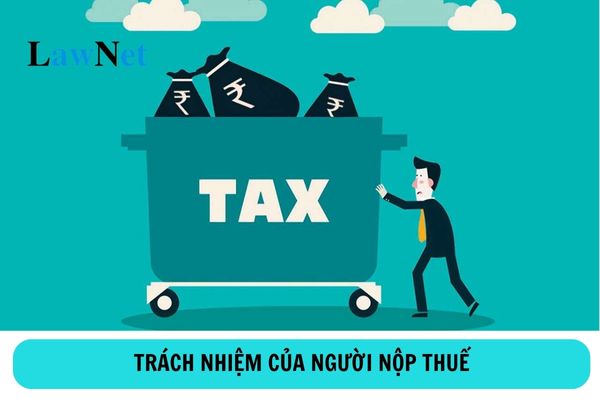What are the responsibilities of the taxpayer in Vietnam?
What are the responsibilities of the taxpayer in Vietnam?
Pursuant to Article 17 of the Law on Tax Administration 2019, the taxpayer has the following responsibilities:
- Conduct taxpayer registration and use the tax code as prescribed by law.
- File taxes accurately, honestly, and completely, and submit tax documents on time; be held accountable before the law for the accuracy, honesty, and completeness of the tax documents.
- Pay taxes, late fees, and penalties fully, on time, and at the correct location.
- Comply with accounting, statistical policies, and the management and use of invoices and documents as prescribed by law.
- Accurately, honestly, and fully record activities that generate tax obligations, tax deductions, and transactions that must declare tax information.
- Issue and deliver invoices and documents to buyers according to the exact quantity, type, and actual payment value when selling goods and providing services as prescribed by law.
- Provide accurate, complete, and prompt information and documents related to the determination of tax obligations, including investment value information; account numbers and transaction contents of accounts opened at commercial banks, other credit institutions; and explain tax calculations, tax filings, and tax payments as required by tax authorities.
- Comply with decisions, notifications, and requests of tax authorities and tax officials as prescribed by law.
- Be responsible for fulfilling tax obligations as prescribed by law in case the legal representative or authorized representative performs tax procedures incorrectly on behalf of the taxpayer.
- Taxpayers engaged in business activities in areas with information technology infrastructure must file taxes, pay taxes, and transact with tax authorities through electronic means as prescribed by law.
- Based on practical conditions and the state of information technology equipment, the Government of Vietnam will detail the situations where taxpayers are not required to submit documents in tax filing, tax payment documents, tax refund documents, or other tax-related documents already available to state management agencies.
- Build, manage, and operate the technical infrastructure system to ensure electronic transactions with tax authorities and to apply information connection systems related to tax obligations with tax authorities.
- Taxpayers with related party transactions must prepare, store, declare, and provide documentation of taxpayer information and related parties' information, including information about related parties residing in countries and territories outside Vietnam as prescribed by the Government of Vietnam.

What are the responsibilities of the taxpayer in Vietnam? (Image from the Internet)
What are the rights of the taxpayer in Vietnam?
Pursuant to Article 16 of the Law on Tax Administration 2019, the taxpayer has the following rights:
- Receive support and guidance on tax payments; be provided with information and documents to fulfill tax obligations and benefits.
- Receive documents related to tax obligations from competent authorities during inspection, examination, and audit.
- Request the tax authority to explain tax calculations and assessment; request the inspection of quantity, quality, and type of exported and imported goods.
- Maintain confidentiality of information, except for information that must be provided to competent state authorities or public tax information as prescribed by law.
- Enjoy tax incentives and refunds according to tax laws; be informed of the tax refund processing times, amounts not refunded, and the legal basis for the non-refunded tax amount.
- Sign contracts with business organizations providing tax service procedures, customs procedure agents to perform tax agency services and customs procedures.
- Receive tax treatment decisions, tax inspection records, tax audit records, request explanations of the tax treatment decisions; maintain opinions in the tax inspection and tax audit records; receive inspection, audit conclusions, and tax treatment decisions from the tax authority.
- Be compensated for damages caused by tax authorities or tax officials as prescribed by law.
- Request tax authorities to confirm the fulfillment of their tax obligations.
- File complaints and lawsuits against administrative decisions and acts related to their legitimate rights and interests.
- Not be subject to administrative penalties for tax violations and not be charged late payment interest if the taxpayer complies with written guidance and treatment decisions of the tax authority, competent state authorities on tax obligation determination.
- Accuse tax officials and other organizations or individuals of legal violations as prescribed by whistleblowing laws.
- Search, view, and print all electronic documents sent to the electronic portal of the tax authority according to the Law on Tax Administration 2019 and electronic transaction laws.
- Use electronic documents in transactions with tax authorities and relevant organizations.
Do taxpayers have to calculate the amount of tax payable themselves?
Pursuant to Clause 2, Article 42 of the Law on Tax Administration 2019, it stipulates:
Principles of tax declaration and calculation
Taxpayers must accurately, honestly, and fully declare the contents in the tax returns according to the form prescribed by the Minister of Finance and submit the required documents and materials in the tax declaration dossier to the tax authority.
Taxpayers calculate the amount of tax payable themselves, except in cases where tax calculation is performed by the tax authority according to the regulations of the Government of Vietnam.
Taxpayers declare and calculate taxes at the local tax authorities where their headquarters are located. If taxpayers centralize accounting at their head office and have dependent units in different provincial-level administrative units from where the head office is located, taxpayers declare taxes at the head office and calculate, allocate payable taxes according to each local budget beneficiary. The Minister of Finance will detail this clause.
For e-commerce business activities, platform-based businesses, and other services provided by foreign suppliers without a permanent establishment in Vietnam, the foreign supplier must directly or authorize the taxpayer registration, tax declaration, and tax payment in Vietnam according to the regulations of the Minister of Finance.
...
Thus, taxpayers have to calculate the amount of tax payable themselves, except in cases where tax calculations are performed by the tax authority as stipulated.

